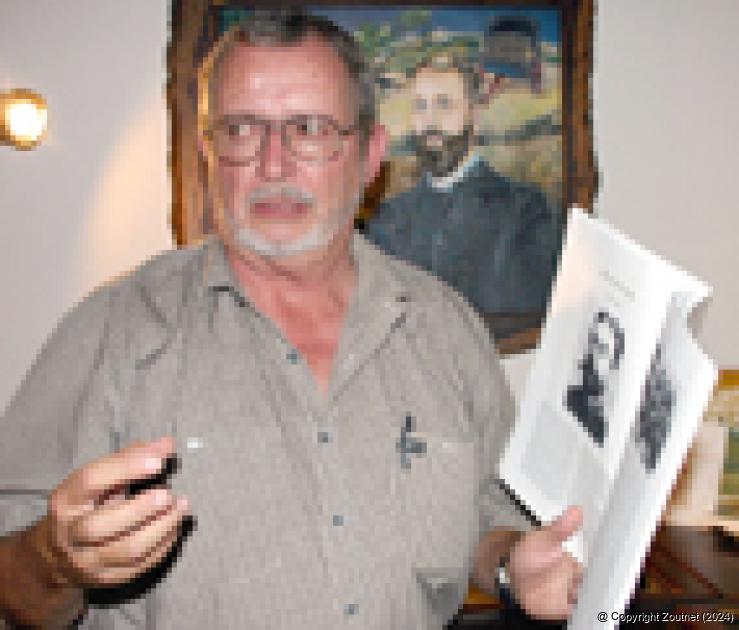
Mr Charles Leach in the Skirmishes and Heritage Foundation Museum at the Lalapanzi Hotel. A civilian, Rev. Heese, who was shot in the war of 1899-1902 appears on a painting behind Mr Leach.
News - Date: 10 February 2006
After more than 100 years, military life in the area has ended to a great extent with the termination of the commandos. Civilian life, however, continues and expands.
The semi-military museum in the area that can already claim international fame is in the process of adding more civilian emphasis. In other ways too, the idea of conserving heritage has virtually exploded and expansion has become a necessity.
“The museum preserves the history of the Anglo Boer War (1899-1902) so that it is still alive after hundred years. The military have had their glory. The civilians got nothing, except a small heap of stones as graves, if it could be found at all. Now honour and remembrance will be brought to all these civilians of different cultural groups,” said Mr Charles Leach, vice-chairman of the Skirmishes and Heritage Foundation.
Monuments in honour of civilians who died in the war are going to be unveiled at a high-profile function on June 2 this year. Australian tourists have already booked their South African tour for the end of May next year with the Zoutpansberg region as the highlight of their itinerary. The Australians booked the tour so that they could be around to attend the unveiling of the monuments in the Skirmishes area.
The Australians want to see the base from where the Australian Lt Harry “Breaker” Morant and the Bushveldt Carbineers operated. In that period, some 24 000 Australians did military service in the country.
“Why did the Australians shoot civilians? Why did they shoot Reverend Heese? I question the integrity of an officer who says they had orders and who shoots a 12-year-old boy dying of malaria, who shoots young children and witnesses?” asked Mr Leach at a function on February 3 at the Lalapanzi Hotel, where the museum is situated. He assured the audience that the Australians tourists will be received very well. No-one is holding what happened 100 years ago against them. Charles Leach and historian Louis Changouin will definitely give the tourists an interesting South African perspective on the incidences which historically connect the Zoutpansberg and Australia.
In the meantime, the museum and the Skirmishes route have found their way onto the Internet and messages from all over the world are being received. Interesting new information that recently came from Bermuda, where 4 700 South Africans were imprisoned, will be disclosed in the book of Charles Leach which could be published by May this year.
The Soutpansberg as a community may not yet have grasped what is actually going on. The museum can develop into one of the most important heritage centres in the country dealing with a specific era of history flowing into many cultures, like coloureds, Indians, Vendas, Shangaans, Afrikaners, Australians, English and Dutch.
A Friends-of-the-Museum organization was envisioned by the Chairman of the Skirmishes and Heritage Foundation, Mr Pikkie Truter. Mr Truter said that the museum is currently funded from private sources, with no support as yet from government’s side. The Foundation expressed its gratitude to Mr Kerneels Kern who registered the Foundation as a Section 21 company at no cost.








